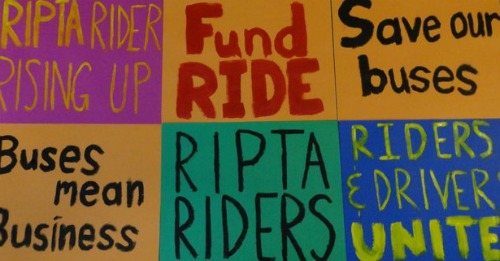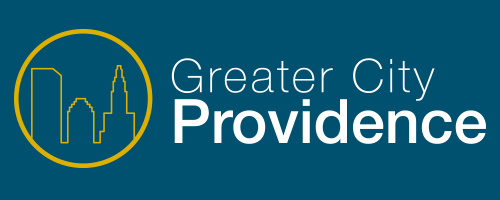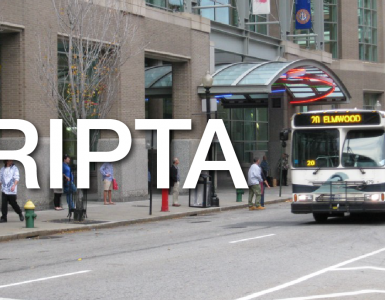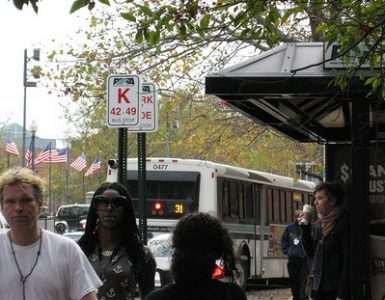
Image from Save RIPTA
RIPTA Riders will be holding a rally at the State House in Providence next Wednesday August 17th. We want to let Smith Hill know: Rhode Island cannot afford to cut bus service.
The rally will begin at 1:30 PM. We plan to arrive by bus (Smith St. side, on #56/57 bus) at 1:30pm Wed Aug. 17th. Let your politicians know that you stand up for bus service in Rhode Island.





And there goes a large sector of RIPTA ridership, those of us who use it to commute to/from work.
Sorry but we cannot usually take off in the middle of the day for things like this.
Its really good news that there is now a “ripta riders” advocacy group to defend the interests of bus passengers. The organizers, with a lot of help from the Sierra Club, have done an excellent job in calling attention to the issue and I hope blog readers who see the value of transit will help them by showing up at the rally. I believe public advocacy, as well as internal cost reductions and efficiencies, and gubenatorial leadership, is needed to have a good chance for General Assembly action, presumably in a supplemental budget.
Being on the State Planning Councl’s Transportatrion Advisory Committee, I want to note that almot every other transportation stakeholder is organized and represented (e.g. motorists, truckers, highway contractors, rail passengers, bicyclists) except bus passengers who until now had no organization, so were easy to overlook. Go Ripta Riders!
Still don’t understand why longer routes cost the same as a one block on/off “route”. Shouldn’t route costs be on a scale of distance traveled? and wouldn’t it help in the expense of running the system?
I agree with Andy that the fare structure is unfair. RIPTA once had 5 zones (thru the 1990s) including a low cost “short zone” in the downtown Providence area (Smith Hill to Davol Sq, Thayer to Central HS) on all lines, but drivers didn’t like having to keep track, and management thought that the zones weren’t worth it since most riders were in zone 1. For now I have been recommending a $3 cash fare on park and-ride expresses, to raise a little revenue, address the fairness issue, and be part of a package to take to the General Assembly.
I think technology can help with the zone issue. I can understand why it was annoying to try and keep track. I do wonder if in the meantime an honor system could be used. Or, perhaps, on the lines that really travel (say the 60 and the 14) you just make them cost more no matter where you get on.
Indeed, there is much that can be done fare-wise with smart card technology such as Seattle’s Orca.
You could create a series of monthly smart card rates. Say (just making up numbers) have a state-wide monthly card which is $40, which allows for unlimited travel on any route anywhere in the state. Then, there could be an urban core card for say $30/month which allows unlimited travel on all buses within the urban core. A commuter card that includes parking and two rides a day (in and outbound), etc.
You can also create debit systems. A South County to Providence bus can be say $2.50 cash fare, but buy a debit fare card and you can travel the same route for $2.00. Similarly, make the urban core buses $2.00 cash, but $1.75 with a fare card. Cash riders have to pay for transfers, debit card users get one free…
The Intelligent Transportation Systems being installed in the buses now, should be able to communicate to the farebox when a bus has entered a new fare zone without the driver having to do anything. So when a bus leaves the Urban Core zone, the Urban Core passes get rejected and the cashbox automagically seeks the higher cash fare.
When I lived in New York, the fare was $1.50; for every $15 you put on your MetroCard, you got a free ride added. MetroCard and Boston’s T Card, when I lived in those cities, allowed for a free guest on Sundays, an incentive to get people to ride.
Moving people over to the card system, by giving them incentives saves RIPTA money on fare collection and allows people to have their bus fare in their pockets at all times, making it easier and more likely for them to ride.
Smart cards can also be time based. Maybe we charge a premium for late night and/or weekend service since it costs more in staffing to run (I’m assuming drivers get a premium rate for off-hours work, maybe I’m wrong).
These fare products then need to be easy to get. I shouldn’t need to go into Kennedy Plaza, I should be able to buy by mail online. Convenience stores and Dunkin Donuts and other place should sell and recharge cards.
Alas, I can’t make it. I have a meeting at the exact same time.
I’ll gladly sign off on a plan for proof-of-payment on the buses (i.e. honor system). It doesn’t need to involve smartcards: throughout the German-speaking world and Scandinavia, POP works with paper tickets. Providence is too small to justify the expense of a smartcard; unless it can piggyback on CharlieCard essentially for free, it’s not worth it.
There’s no need for a complex zone system, either. The simplest thing to do would be to have three zones: downtown (1), the urban areas around it (2), and the rest of the state (3). A ticket for zones 1-2 or 2-3 costs less than a ticket for zones 1-3. All boundaries should be very easy to figure out – e.g. zone 2 should encompass the cities of Providence, Pawtucket, and Cranston.
If it’s desirable to have time-based pricing, the premium time should be the peak, not the off-peak. Although the average cost per rider is lower in the peak, the marginal cost is higher. The reason is that if there are enough riders to require extra bus frequency, it’s cheaper to have it in the off-peak than in the peak, since in the peak it would require paying for a split shift and maybe an extra bus.
Statehouse rally condemns proposed RIPTA cuts [The Providence Journal]
Poor Mr Sagouros was wasted on this RALLY!! He said,” RIPTA was a well run but under funded public transporation system. ” and so much more the news media didn’t pass on.
I find it intersting that while RIPTA said ridership was up they are forced to cut! Then I read that the State is happy to spend over a million dollars to improve roads in Newport for Yatching!!
Newport needs a better Public Transporation system! You go to one RALLY and discover than not only is Public Transportation not working but State Goverment and the News Media don’t work. Who wants to get out of bed for the next RALLY???